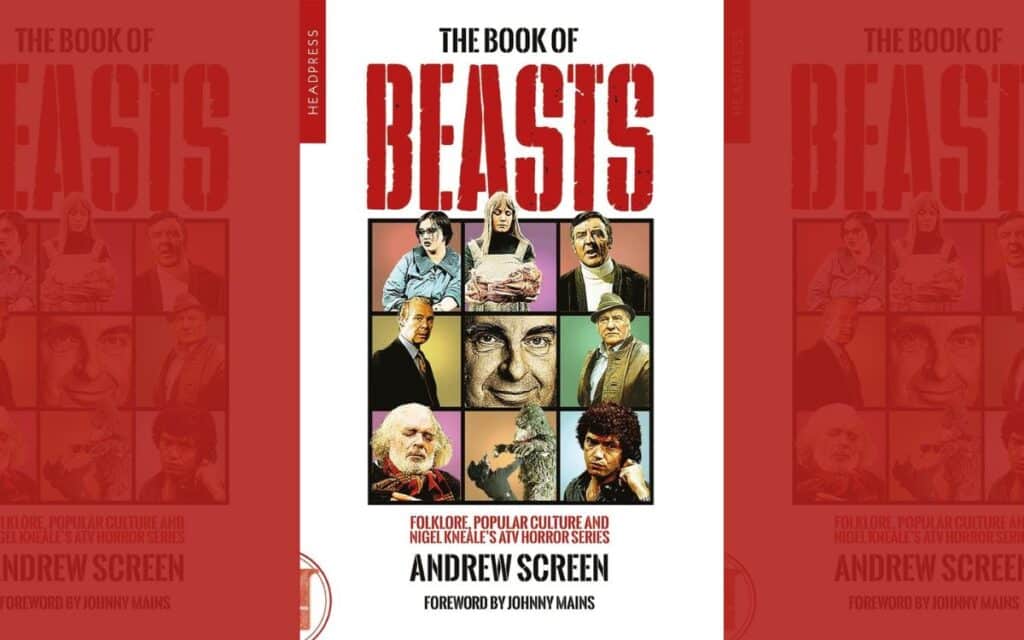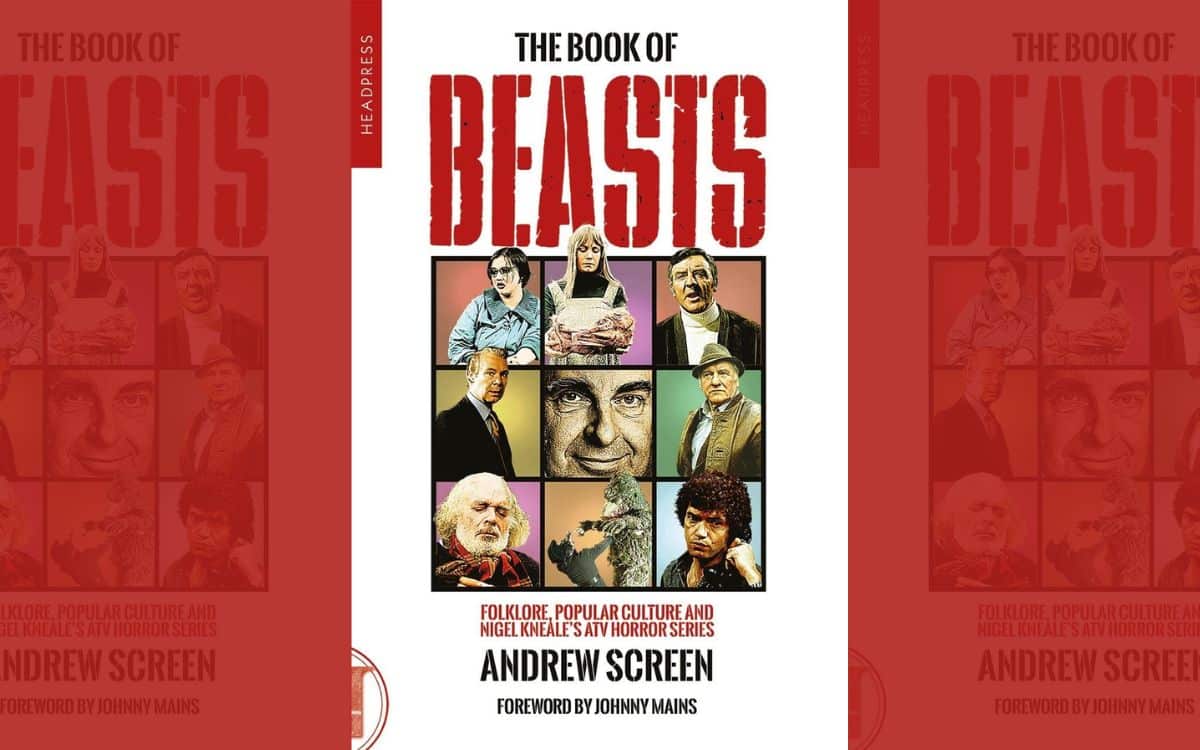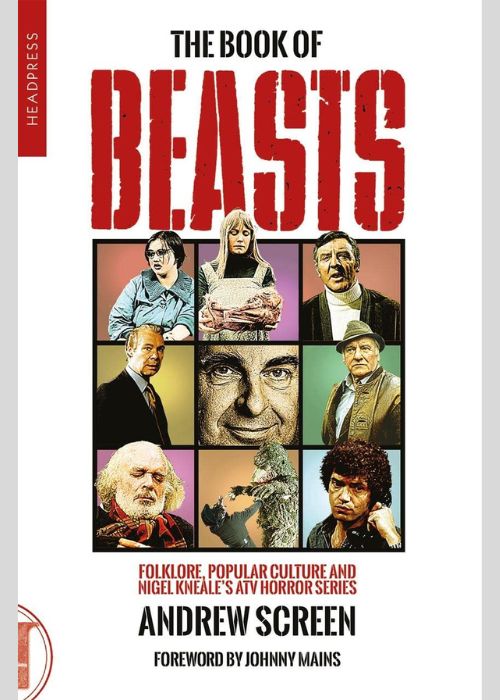The Book of Beasts, by Andrew Screen, explores the ground-breaking British 1970s horror anthology series Beasts. DAVID SAUNDERSON talks to the author about his new work.

The Book of Beasts Interview with Andrew Screen
SPOOKY ISLES: You’ve written about many TV shows and horrors over the years, including similar anthology series to Beasts. What was it about this Nigel Kneale series that made you want to dedicate a book to it?
ANDREW SCREEN: For me Beasts is one of the reasons I love horror. I saw it on original transmission, aged nine, and it stuck with me. When I came to write the book I wanted to look at something by Nigel Kneale that hadn’t been as well documented as some of his other productions such as Quatermass and The Stone Tape. With this in mind Beasts seemed an obvious choice.
What do you think sets Beasts apart from other horror anthologies of its time?
It’s written by Nigel Kneale! Most contemporary anthologies were written by several authors, but Beasts has a singular voice and vision of humanity compared to them.
When you look at the career of Nigel Kneale, you see that it is so wide and varied. But Quatermass seems to be the one that gets the most attention. Where do you think Beasts sits in terms of Kneale’s work?
It marks Kneale’s departure from the BBC and working for independent television. I’m not sure the series marks any type of change or evolution in the terms of Kneale’s output and themes.
Simple question, what is your favourite Beasts episode and why?
Ask me on a different day and you would probably get a different answer, but I think the touchstone episode for me is During Barty’s Party. It is so clever on so many levels. It could be a radio play, stage play, film or written short story. It works across all media.
In The Book of Beasts, you discuss episodes that were prepared but never realised. Could you share some insights into why Kneale abandoned these storylines?
At some point Kneale and the producer, Nicholas Palmer, sat down with a list of around 20 story titles and would have discussed the ideas behind them. From that list, six became the episodes of Beasts. These, and an additional three, were then developed into story outlines which would have then been reviewed and decided to develop further into scripts or abandon.
When you read the outlines, it’s fairly obvious one was just too complicated and expensive to mount as it would have featured a life-size dinosaur! The other two didn’t really fit into the umbrella theme of the series.
One was more of a social satire involving a TV talent show and the other, whilst containing an animal element, was more of tragedy in some senses. Neither fitted the encompassing theme that man is the real beast.
You’ve contextualised each episode with real-life developments and events. A standout of this book is your incredible research into the many different themes of each episode. Could you give an example of how this approach enhances our understanding of the series?
The episode Special Offer is often described as “Carrie in a supermarket” and in the book I examine this in detail comparing Stephen King’s story (in all iterations) to Kneale’s tale.
For the episode During Barty’s Party I look at the media outrage / scare mongering at the time regarding rats becoming immune to poisons. This inspired several rat themed TV productions – Doomwatch, The New Avengers – of which Barty’s Party can be seen to be part of.
Hopefully this gives insight into the areas that Kneale was exploring by tapping into then current fears and ideas in popular culture. Like most writers he was inspired by the world around him and his own personal interests.
I’m always interested in hearing about the research that goes into these kinds of books, especially with the interviews. How did you go about securing interviews with the cast and crew, and were there any surprising revelations that came out of these conversations?
I sent letters or emails to the actors either directly or via their agents. A friend of mine, Caroline Champion, is brilliant at tracking down people and put me in touch with the special effects technician George Leuenberger, after she had found him via contacting his son.
Sadly by the time I had contacted the director Richard Bramall, he was too ill and died a short while afterwards.
Toby Hadoke was extremely helpful in arranging contact with David Simeon and also shared an interview he had recently done with Colin Bell (the voice of Barty). As for revelations, not really to be honest.
Could you elaborate on the challenges and rewards of gaining rare access to Kneale’s original scripts and production paperwork?
Kneale’s son and daughter, Matthew and Tacy, were wonderful. They granted permission to use material from Kneale’s scripts and files in the book. It was Andy Murray who alerted me to the fact that there was a production file for Beasts preserved on the Isle of Man.
Getting access was relatively straight forward once Tacy and Matthew had given their blessing. It fell into place quite neatly. I suppose the major reward was when I started looking through the files and found the outlines for the unmade episodes. No one knew they existed and here I was reading completely original, previously unknown Nigel Kneale stories. I was possibly the only person to see them in years apart from Kneale himself and Nicholas Palmer (who would have discussed them before deciding not to develop them further).
How do you think Beasts has influenced other horror anthologies over the years?
I’m not sure Beasts has influenced another series directly, though it definitely inspired other writers when they came to create their own anthologies. It inspired them to become writers, especially within the field of horror. Reece Shearsmith and Mark Gatiss are the obvious ones, but I think Tom De Ville, who created the Channel 5 anthology series Urban Gothic, and Stephen Volk are all fans of Beasts and Nigel Kneale.
This is the first indepth study of Beasts, and I can’t image there are many series with only six episodes (seven if you include Murrain). Would you consider doing this again for another series and if so, what?
I do have another idea for a book, currently in the very early stages, and this will look at a specific type of horror film or TV show. Can’t say anymore at present.
If I was to concentrate on one series then it would be the BBC series Leap in the Dark which ran for four seasons between 1973 and 1980. The first season were documentaries on various aspects of the paranormal. The second and third seasons were docudramas about real life paranormal experiences presented by Colin Wilson. The final season consisted of original dramas written by the likes of Alan Garner and David Rudkin.
So as well as there being an evolution in the televisual form of the series you have a rich background of real world material and fiction contributions from some of the finest writers of the time.
It would require a lot of research and the finished book would probably be even bigger than Beasts!



